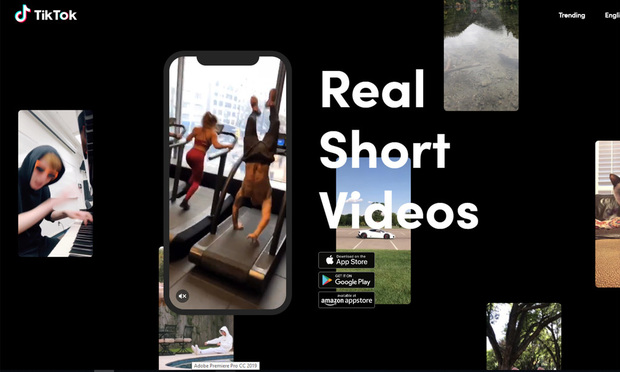FTC Hits Musical.ly With Record-Setting $5.7M Fine
Musical.ly, also known as TikTok, has been hit with the highest-ever FTC penalty for COPPA violations. The FTC alleged Musical.ly collected young children's data without parental consent.
February 27, 2019 at 03:16 PM
3 minute read
 TikTok (Photo: Courtesy Photo)
TikTok (Photo: Courtesy Photo)
The U.S. Federal Trade Commission issued a record-setting fine in a settlement with Musical.ly on Wednesday, alleging the social media platform violated the Children's Online Privacy Protection Act.
The $5.7 million penalty is the largest the FTC has issued over COPPA violations. Musical.ly, also known as TikTok, is alleged to have collected children's personal data without parental consent. An email address, phone number, full name, username, a profile picture and a short bio are required to sign up for Musical.ly's app.
Prior to 2017, the company didn't ask users' ages or prevent those under 13 from creating accounts. Under COPPA, companies must obtain parental consent when collecting personal data from children under 13. Musical.ly didn't retroactively check users' ages after updating its policy.
“The operators of Musical.ly—now known as TikTok—knew many children were using the app, but they still failed to seek parental consent before collecting names, email addresses, and other personal information from users under the age of 13,” said FTC chairman Joe Simons in a press release Wednesday. “This record penalty should be a reminder to all online services and websites that target children: We take enforcement of COPPA very seriously, and we will not tolerate companies that flagrantly ignore the law.”
The FTC also expressed concern with Musical.ly's default “public” setting for videos shared by users, claiming it allowed adult users to see children's online bios and information. Musical.ly's app also allows users to direct message others on the platform.
Musical.ly announced Wednesday it will now split users into “age appropriate TikTok environments,” following FTC guidelines for apps that target adults and children. TikTok's section for children does not include user's personal information and restricts content and user interaction on the platform. The changes will impact new users and those already on the platform, Musical.ly said.
“While we've always seen TikTok as a place for everyone, we understand the concerns that arise around younger users,” Musical.ly representatives wrote in a blog post Wednesday.
“In working with the FTC and in conjunction with today's agreement, we've now implemented changes to accommodate younger U.S. users in a limited, separate app experience that introduces additional safety and privacy protections designed specifically for this audience,” the blog post continued. Musical.ly declined to provide additional comment.
The FTC's settlement with Musical.ly comes less than a week after children's advocacy groups filed a complaint about another social media platform's alleged COPPA violations.
On Feb. 21, advocacy groups urged the FTC to investigate Facebook's alleged practice of allowing children to complete in-app purchases in games on the platform, sometimes spending thousands of dollars without their parents' consent. Apple and Google previously faced similar COPPA violation complaints.
Read More:
Complaint Against Facebook Offers Platforms a Chance to Update In-App Purchase Policies
This content has been archived. It is available through our partners, LexisNexis® and Bloomberg Law.
To view this content, please continue to their sites.
Not a Lexis Subscriber?
Subscribe Now
Not a Bloomberg Law Subscriber?
Subscribe Now
NOT FOR REPRINT
© 2025 ALM Global, LLC, All Rights Reserved. Request academic re-use from www.copyright.com. All other uses, submit a request to [email protected]. For more information visit Asset & Logo Licensing.
You Might Like
View All
'Better of the Split': District Judge Weighs Circuit Divide in Considering Who Pays Decades-Old Medical Bill

K&L Gates Files String of Suits Against Electronics Manufacturer's Competitors, Brightness Misrepresentations
3 minute read
Ill. Class Action Claims Cannabis Companies Sell Products with Excessive THC Content
4 minute read
Plaintiffs Attorneys Awarded $113K on $1 Judgment in Noise Ordinance Dispute
4 minute readTrending Stories
Who Got The Work
J. Brugh Lower of Gibbons has entered an appearance for industrial equipment supplier Devco Corporation in a pending trademark infringement lawsuit. The suit, accusing the defendant of selling knock-off Graco products, was filed Dec. 18 in New Jersey District Court by Rivkin Radler on behalf of Graco Inc. and Graco Minnesota. The case, assigned to U.S. District Judge Zahid N. Quraishi, is 3:24-cv-11294, Graco Inc. et al v. Devco Corporation.
Who Got The Work
Rebecca Maller-Stein and Kent A. Yalowitz of Arnold & Porter Kaye Scholer have entered their appearances for Hanaco Venture Capital and its executives, Lior Prosor and David Frankel, in a pending securities lawsuit. The action, filed on Dec. 24 in New York Southern District Court by Zell, Aron & Co. on behalf of Goldeneye Advisors, accuses the defendants of negligently and fraudulently managing the plaintiff's $1 million investment. The case, assigned to U.S. District Judge Vernon S. Broderick, is 1:24-cv-09918, Goldeneye Advisors, LLC v. Hanaco Venture Capital, Ltd. et al.
Who Got The Work
Attorneys from A&O Shearman has stepped in as defense counsel for Toronto-Dominion Bank and other defendants in a pending securities class action. The suit, filed Dec. 11 in New York Southern District Court by Bleichmar Fonti & Auld, accuses the defendants of concealing the bank's 'pervasive' deficiencies in regards to its compliance with the Bank Secrecy Act and the quality of its anti-money laundering controls. The case, assigned to U.S. District Judge Arun Subramanian, is 1:24-cv-09445, Gonzalez v. The Toronto-Dominion Bank et al.
Who Got The Work
Crown Castle International, a Pennsylvania company providing shared communications infrastructure, has turned to Luke D. Wolf of Gordon Rees Scully Mansukhani to fend off a pending breach-of-contract lawsuit. The court action, filed Nov. 25 in Michigan Eastern District Court by Hooper Hathaway PC on behalf of The Town Residences LLC, accuses Crown Castle of failing to transfer approximately $30,000 in utility payments from T-Mobile in breach of a roof-top lease and assignment agreement. The case, assigned to U.S. District Judge Susan K. Declercq, is 2:24-cv-13131, The Town Residences LLC v. T-Mobile US, Inc. et al.
Who Got The Work
Wilfred P. Coronato and Daniel M. Schwartz of McCarter & English have stepped in as defense counsel to Electrolux Home Products Inc. in a pending product liability lawsuit. The court action, filed Nov. 26 in New York Eastern District Court by Poulos Lopiccolo PC and Nagel Rice LLP on behalf of David Stern, alleges that the defendant's refrigerators’ drawers and shelving repeatedly break and fall apart within months after purchase. The case, assigned to U.S. District Judge Joan M. Azrack, is 2:24-cv-08204, Stern v. Electrolux Home Products, Inc.
Featured Firms
Law Offices of Gary Martin Hays & Associates, P.C.
(470) 294-1674
Law Offices of Mark E. Salomone
(857) 444-6468
Smith & Hassler
(713) 739-1250








